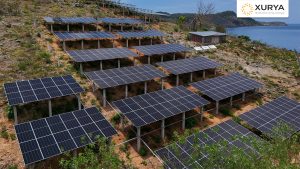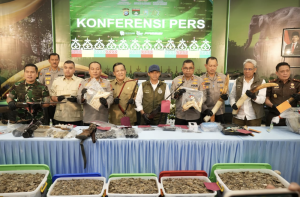Jakarta – Energy analysts have urged the Daya Anagata Nusantara Investment Management Agency (Danantara) to focus more on renewable energy investments rather than extractive sectors such as coal. They warn that if Danantara continues to prioritise investment in fossil-based industries, Indonesia risks huge economic losses and failure to achieve its net-zero emissions (NZE) target by 2050.
Executive Director of Yayasan Kesejahteraan Berkelanjutan Indonesia (SUSTAIN), Tata Mustasya, said in a written statement on Thursday, 27 March, that since its inception, Danantara has drawn negative responses from the public and the market. This is mainly because the organisation is still focused on extractive industries, which contradicts the government’s commitment to energy transition.
“If Danantara wants to build credibility and public trust, it should take a strategic step by shifting its investments to the green sector. Renewable energy is more environmentally friendly and has more favourable economic prospects in the long run,” Tata said.
He compared it to Temasek, Singapore’s investment arm, which has allocated around USD 32.6 billion or 11 per cent of its total portfolio to sustainability projects. This trend is expected to increase as the global shift towards a green economy continues.
Meanwhile, other Asian countries have already shown a strong commitment to renewable energy development. China, for example, leads the world in solar and wind installations, with more than 700 gigawatts (GW) of capacity by 2023. Vietnam has also installed 13 GW of solar power since 2017, fuelled by progressive incentive policies.
Based on SUSTAIN’s calculations, Indonesia needs an investment of around USD 37 billion to meet the target of 23 percent renewable energy in the national energy mix by 2025. According to Tata, these funds could be obtained from the coal sector’s additional levies, which amount to USD 23.58 billion per year.
However, the economic risks will be even greater if the government continues to encourage Danantara to fund extractive projects such as coal gasification. According to a study by the Institute for Energy Economics and Financial Analysis (IEEFA), coal gasification projects can potentially lose up to USD 377 million and require a government subsidy of USD 354 per tonne of dimethyl ether (DME) produced.
IEEFA’s Energy Finance Specialist, Mutya Yustika, emphasised that global investment trends increasingly prioritise sustainability. If Indonesia does not immediately shift its investment focus to clean energy, it could fall behind the global trend and miss major investment opportunities.
“Investment in renewable energy is profitable from a business perspective and can also strengthen the national industrial supply chain. Meanwhile, fossil-based projects have high risks and are increasingly difficult to obtain funding from global investors,” Mutya said.
The government’s commitment to energy transition has been emphasised in various international forums, including the G20. However, without real implementation, this commitment could lose credibility in the eyes of the world. By 2024, Indonesia’s solar power capacity will only reach 675 megawatts (MW), far from the 6,500 MW target in the 2025 National Energy General Plan (RUEN).
In this situation, Danantara has a crucial role in helping Indonesia achieve its clean energy targets. By allocating its resources to renewable energy, the investment agency can contribute to the sustainability of the national economy and improve Indonesia’s image in the eyes of global investors.
“This move is not only economically beneficial, but also ensures that Indonesia remains on track to achieve NZE by 2050,” concluded Clean Transition Executive Director Abdurrahman Arum. (Hartatik)
Banner photo: shutterstock















